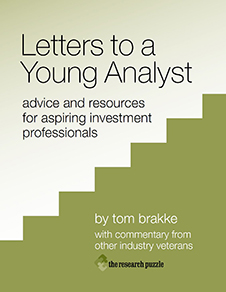
- Thursday, March 17th, 2011
- investment brackets
-
The NCAA brackets are in, but that won’t stop the extension of the concept to all manner of comparative efforts. Pardon me while I jump on the bandwagon.
I think bracketology reached its high point in 2007 with the publication of The Enlightened Bracketologist: The Final Four of Everything.Bloomsbury USA | The book was edited by Mark Reiter and Richard Sandomir. The book features a wide array of contests, with the winners picked by experts in each area. From conspiracy theories to pickup lines to sidekicks to guitar solos, plus golf swing thoughts, plastic surgery disasters, male vices, and many more. A hundred and one brackets in all.
Some even veer into the investment realm. Buffett wiped out all of his competitors for best CEO, of course, even though he’s anything but a typical CEO. The winner in the economic indicators tournament? “Whatever last year’s forecast was,” which came out of the Incestuous Regional and was crowned with this conclusion: “Elegant, minimalist, and beats other forecasts with surprising frequency.”
As for investment strategies, Clark WinterClark Winter | Then at Citigroup Global Wealth Management; now he’s on his own. did the picking. Ironically given current events, his winner was “Japanese equities.” Prefacing his comments by indicating that no investment is always best and that he was talking about 2007, he went on to say that the things that perform best over time “are those that provide the most leverage.” Well, it was the dance of the times.
One of the things that I like about the book is that there are descriptions of why the winner of some key “games” came out ahead. That’s a good lesson for us as we consider our own brackets of investment possibilities at any point in time. Writing down your expectations helps to synthesize your thoughts and provides documentation to look back at as part of the necessary evaluation process.
Given the number of different investment vehicles and strategies, we all would fill out our brackets differently. We have our favorites — and those we would never pick because they burned us years ago.
Some of us love to play the long shots and others select the number-one seeds. We choose from the perennial contenders that are always in the mix and the Cinderella stories of late. Chinese retail REITs scored a hundred points a game last year? They’ll be picked to go deep by many, even if they lack a defensive strategy.
There are those who focus on the teams with momentum and those who look for the ones with sound fundamentals. (You have to be careful; uranium looked to have both not that long ago.) The arbitrageurs seek an edge in the mispricings of the crowd’s picks, hoping to lock in the odds just before the window closes. And the hedge funds consult orthopedic surgeons to estimate the pace of a star’s recovery.
For those keeping score in an attempt to find out who is best, selecting an appropriate time frame is critical. While we know when the NCAAs will be over for the year — even if we don’t know who will be cutting the nets — the market tournament goes on and on. As a result, investments and investment managers are commonly judged according to the calendar, with new winners holding trophies each month, quarter, and year for competitions that may or may not have demonstrated their skill.
The investment arena of today allows for all sorts of game plans — and a little guy in his basement might even pull off the upset of the year against an industry behemoth. You may be a prop trader, in effect filling out a new bracket sheet every day. Or you might be a value investor that shrugs his shoulders and says, “Go ahead, play your little games that don’t matter. Let’s take a look in five years to see who won.”
What a business. Let the games continue, without end.
